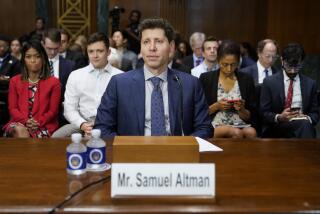Stirring the ‘Dot-Whatever’ Pot
- Share via
While most Americans are focused on the looming national elections, there was another interesting election last week, one with some intriguing implications for the future. The Internet Corp. for Assigned Names and Numbers, or ICANN, which is based in Marina del Rey, conducted the world’s first global “cyber-election.” Internet users around the world voted five new at-large members onto ICANN’s board of directors, one for each major continent.
ICANN is the not-for-profit corporation launched two years ago to manage the systems that make Internet addresses work. These include the domain name system--through the “.com,” “.org,” “.gov” and other suffixes on Web page and e-mail addresses--and the underlying Internet numerical address system, which assigns unique address numbers to networked computers and other devices.
ICANN is considering, among other things, adding new domain name suffixes--called Top-Level Domains--to the Internet, such as “.web,” “.kids” and “.biz,” to name just a few.
ICANN has been controversial since its inception. Critics have charged that it has a distinct tilt favoring large-business interests, that its meetings and decisions are less than completely open, and that its structure is not sufficiently democratic or inclusive.
In response to some of these complaints, and with funding assistance provided by the Markle Foundation in New York, ICANN created at-large seats on its board, positions filled by the unprecedented, worldwide virtual election that concluded Tuesday. Potential voters had registered this summer, once again through the Internet, and then cast their votes through an online election developed and managed by the New York electronic voting firm Election.com. The candidate slates were divided by continent in order to prevent dominance by U.S. or European voters.
The North American position was won by Karl Auerbach, an engineer and researcher for Cisco Systems, the giant network-equipment firm in San Jose. Auerbach, who lives in Santa Cruz, has been an outspoken critic of ICANN. His election platform, for example, calls for the resignation or firing of ICANN’s chief executive, Michael Roberts, and the same for the organization’s secretary and general counsel, Louis Touton. “Part of my platform was to get rid of the senior staff,” he said.
Auerbach is blunt, to say the least. ICANN’s Roberts, he told me, “created a style of condescending arrogance that is not good for the organization. . . . I will not tolerate Michael Roberts trying to be king of the Internet.”
Also somewhat surprising to observers was the election of Andy Mueller-Maguhn of Germany for the European at-large seat. He is a longtime member and spokesman for the Chaos Computer Club in Germany, a loose organization of hackers that has been linked to computer break-ins, although Mueller-Maguhn himself has been an advisor on Internet policy to the German government. His opinions on ICANN are nearly identical to Auerbach’s, so the two of them are likely to be the source of some interesting hell-raising once they take their positions next month at the ICANN board meeting in Marina del Rey.
The other three election winners--Ivan Moura Campos for Latin America and the Caribbean; Masanobu Katoh for Asia, Australia and the Pacific; and Nii Quaynor for Africa--are expected to be supportive of most, if not all, of ICANN’s current policies and character. Unfortunately, no women were elected to the ICANN board.
The at-large members will be outnumbered on the board--appointed members still number 19, including chairman Esther Dyson, who will leave the board at its meeting next month, and Vint Cerf, the co-inventor of the Internet Protocol and widely regarded as one of the “fathers” of the Internet.
“The at-large members are very much in the position of Sisyphus. We’re going to be frustrated over everything we try to do,” Auerbach told me last week. On the other hand, he said, “Being on the inside is incredibly important. No one is going to shut me up when I make a point. I hope to set a standard of transparency that other board members will be held to.”
Both Auerbach and Mueller-Maguhn are expected to push for more democratic and open procedures, a significant expansion of top-level domains and an end to the $50,000 fee ICANN has required of companies or individuals who sign up to manage a domain. They also have promised to be counterweights to ICANN’s tendency to favor trademark holders in disputes about domain names. Large trademark holders--typically large companies--want to limit the number of new domains so they don’t have to police a lot of domains for trademark violations. Auerbach and Mueller-Maguhn believe that’s curtailment of free speech and the democratic potential of the Net.
Auerbach fairly radiates anger with the way ICANN has worked so far, but, he said, “Policy matters can be reversed.” In addition to his technical expertise--Auerbach has been an Internet engineer since 1974, he says--he is not just coincidentally an attorney.
Esther Dyson said about the new board members, “I think we’re going to learn a lot from them, and they’re going to learn a lot from serving on the ICANN board. So it’s a good thing.”
The technical arcana of domain names and Internet addresses may seem remote from daily life.
But technical and policy decisions about how the Internet works will have a profound influence on privacy, freedom of expression, censorship and the balance of power among governments, corporations and individuals.
Observers of the ICANN controversy--especially ICANN’s critics--view this as an important dispute, if only because ICANN is the earliest prototype of what might loosely be described as Internet governance. “The Internet is in Day One of its infancy,” Auerbach said.
*
Gary Chapman is director of the 21st Century Project at the University of Texas at Austin. He can be reached at gary.chapman@mail.utexas.edu. Recent Digital Nation columns are available at https://www.latimes.com/dnation.






